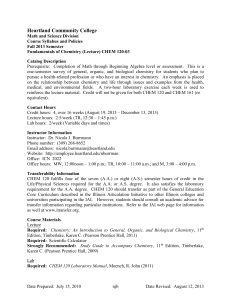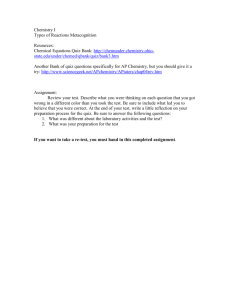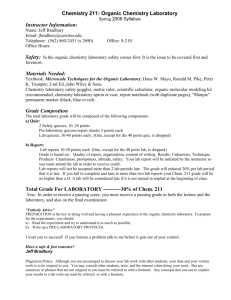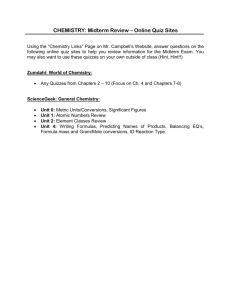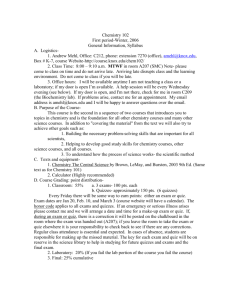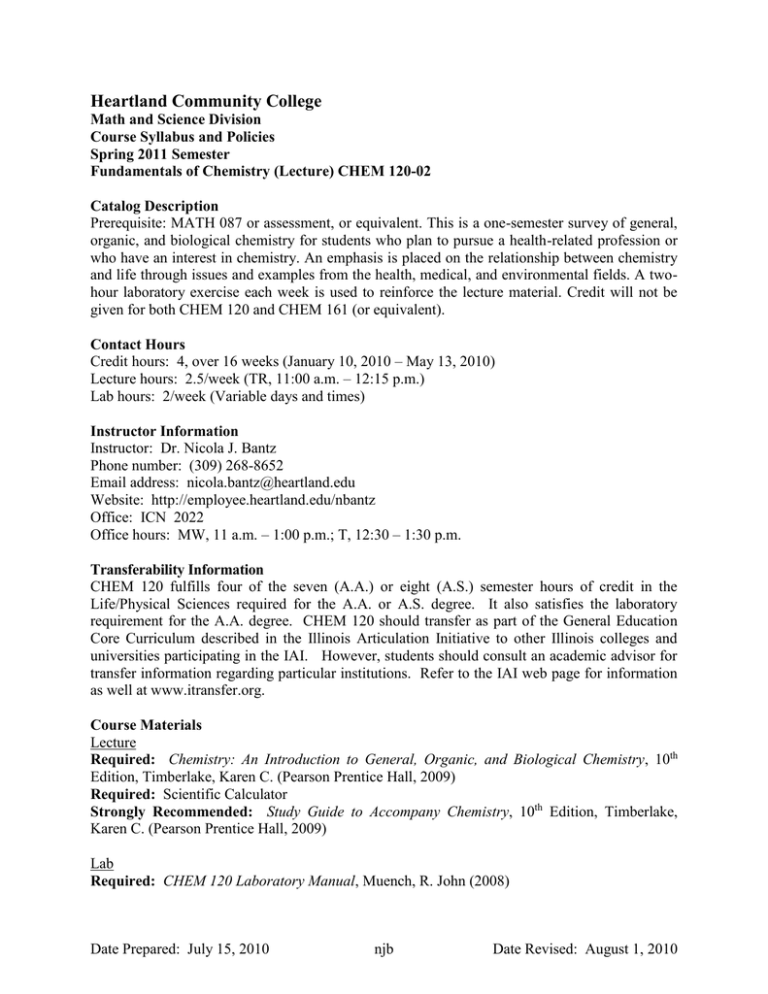
Heartland Community College
Math and Science Division
Course Syllabus and Policies
Spring 2011 Semester
Fundamentals of Chemistry (Lecture) CHEM 120-02
Catalog Description
Prerequisite: MATH 087 or assessment, or equivalent. This is a one-semester survey of general,
organic, and biological chemistry for students who plan to pursue a health-related profession or
who have an interest in chemistry. An emphasis is placed on the relationship between chemistry
and life through issues and examples from the health, medical, and environmental fields. A twohour laboratory exercise each week is used to reinforce the lecture material. Credit will not be
given for both CHEM 120 and CHEM 161 (or equivalent).
Contact Hours
Credit hours: 4, over 16 weeks (January 10, 2010 – May 13, 2010)
Lecture hours: 2.5/week (TR, 11:00 a.m. – 12:15 p.m.)
Lab hours: 2/week (Variable days and times)
Instructor Information
Instructor: Dr. Nicola J. Bantz
Phone number: (309) 268-8652
Email address: nicola.bantz@heartland.edu
Website: http://employee.heartland.edu/nbantz
Office: ICN 2022
Office hours: MW, 11 a.m. – 1:00 p.m.; T, 12:30 – 1:30 p.m.
Transferability Information
CHEM 120 fulfills four of the seven (A.A.) or eight (A.S.) semester hours of credit in the
Life/Physical Sciences required for the A.A. or A.S. degree. It also satisfies the laboratory
requirement for the A.A. degree. CHEM 120 should transfer as part of the General Education
Core Curriculum described in the Illinois Articulation Initiative to other Illinois colleges and
universities participating in the IAI. However, students should consult an academic advisor for
transfer information regarding particular institutions. Refer to the IAI web page for information
as well at www.itransfer.org.
Course Materials
Lecture
Required: Chemistry: An Introduction to General, Organic, and Biological Chemistry, 10th
Edition, Timberlake, Karen C. (Pearson Prentice Hall, 2009)
Required: Scientific Calculator
Strongly Recommended: Study Guide to Accompany Chemistry, 10th Edition, Timberlake,
Karen C. (Pearson Prentice Hall, 2009)
Lab
Required: CHEM 120 Laboratory Manual, Muench, R. John (2008)
Date Prepared: July 15, 2010
njb
Date Revised: August 1, 2010
Required Reading and Writing
This course will require approximately 500 pages of text from both the lecture and lab textbooks
over a 16-week period. Written analysis will be required in the form of problem sets, quizzes,
exams, and laboratory reports.
Course Description and Learning Objectives
This is a survey course in General, Organic, and Biological Chemistry, designed to provide a
background in all of these areas for the student interested in the health-related professions by
examining issues in the health, medicine, and environmental fields (DI3). The first three-fourths
of the class will require some basic math and chemistry skills, while the last fourth of class will
be a survey of Organic and Biological Chemistry. This course will cover fundamental topics
such as measurements and conversion factors, atomic and molecular structure and function, and
chemical reactions.
By the end of this course, students will have developed an understanding of the fundamental
concepts of chemistry, as well as critical thinking and analysis skills. While learning and
understanding the core concepts of chemistry will be vital for success, emphasis on exams, quizzes,
and problem sets will be placed on critical thinking and problem solving abilities. This means that
while approximately half of the questions on these assessments will be based directly from material
presented in class (PS1, PS2), many problems will ask you to use or interpret your knowledge in a
new, related way (PS3, PS4, CT1, CT2, CT3). This will be achieved by
-
understanding and applying the metric system in conversion factors,
determining atomic and molecular structure and electron configurations,
distinguishing between ionic and covalent bonds and their molecular properties,
completing and balancing chemical equations (stoichiometry),
understanding the relationship between temperature and energy,
understanding the properties of gases and the relationship between them,
distinguishing between different types of solutions and expressing their concentrations,
identifying and comparing the properties of acids and bases
identifying the types, uses, and effects of nuclear radiation,
classifying compounds both by their functional groups and their IUPAC names,
recognizing and applying chemical reactions of classes of organic molecules, and
determining the structure and importance of carbohydrates, lipids, and proteins
The lab portion of this class will highlight concepts presented in lecture using practical techniques.
Specific aspects of the lab course will be detailed by the lab instructor.
Date Prepared: July 15, 2010
njb
Date Revised: August 1, 2010
Method of Evaluation (Grading System)
Grades will be determined by a combination of problem sets, quizzes, exams, and lab work
("assessments"). Points will be distributed as follows:
Assessment
Number of Each
Assessment
4
5*
4
1
Points Possible (Each)
Total Points
Problem Sets
25
100
Quizzes
25
100
Lecture Exams
100
400
Lecture Final Exam
200
200
Lab Activities †
200
1000
Total Points Possible
* Lowest quiz score will be dropped.
† For specific distribution of points, see the syllabus distributed by the lab instructor.
Grades will be based on a set scale:
A: ≥ 85.0%
B: 75.0 – 84.9%
C: 65.0 – 74.9%
D: 60.0 – 64.9%
Incompletes will only be given in rare circumstances, approved by the course instructor.
Lecture Schedule
Week of
Chapter(s) Covered
January 10
1
January 17
3
January 24
3, 4
January 31
4
February 7
5
February 14
5
February 21
2
February 28
6
March 7
March 14
7
March 21
7, 8
March 28
8, 9
April 4
9, 10
April 11
10
April 18
11
April 25
12, 13
May 2
13, 14, 15, 16
PS, Quiz, or Exam?
Problem Set 1 Due (R)
Quiz 1 (T)
Special Notes
Classes Begin
No Class M (T*)
Exam 1 (T) (Ch. 1, 3, 4)
Problem Set 2 Due (T)
Quiz 2 (T)
No Class (Spring Break)
Exam 2 (T) (Ch. 2, 5, 6)
Problem Set 3 Due (R)
Quiz 3 (R)
Quiz 4 (T)
Exam 3 (T) (Ch. 7 – 9)
Problem Set 4 Due (T)
Quiz 5 (T)
Exam 4 (T) (Ch. 10 – 13)
Comprehensive Final Exam
May 9
None
Final Exam Week
(R, May 12; 10:00 – 11:50 a.m.)
Consult the Heartland Community College Calendar for drop and withdraw dates.
Please note that this schedule is tentative and may change.
Date Prepared: July 15, 2010
njb
Date Revised: August 1, 2010
Attendance and Make-Up Policy
Attendance for the lecture portion of the course is strongly recommended, not required.
Attendance for the lab portion of the course is required. Any student missing more than two labs
can fail the course.
Quizzes cannot be made up for any reason. If you miss a quiz, this will count as your dropped
quiz. Lecture exams cannot be made up after their scheduled date, except under highly
extenuating circumstances, as approved by the course instructor. If you know well in advance
that you will miss an exam, talk to the course instructor to schedule to take your exam before the
scheduled date.
Please remember to either turn off or put your phone into silent mode before the start of each
lecture and lab, in order to minimize disruptions. The course instructor reserves the right to
dismiss repeat offenders from a class period after an interruption.
Homework, Problem Sets, Quizzes, and Exams
One full class period will be devoted to each exam. Quizzes will be given at the end of class
periods, with 30 – 45 minutes devoted to the quiz, depending on the content and difficulty level.
Course exams and quizzes will consist of questions in a variety of formats, including (but not
limited to) multiple choice and free response. No partial credit will be given for multiple choice
questions. Partial credit will be given on the free response questions, so be as complete as
possible! Your lowest quiz score will be dropped at the end of the semester.
Selected homework problems assigned for each chapter in the textbook are completely optional.
No grades or point values will be assigned to homework problems. The content of these
questions will usually be highly reflective of the content included in quiz and exam questions.
Therefore, completing the supplemental homework is strongly recommended, as doing so will
give you an opportunity to demonstrate your mastery of topics presented in class.
Four problem sets will be given out during the semester, and these should be completed for
course credit. The textbook and internet are acceptable resources of information for these
problem sets. While working on these problem sets with a group of peers is strongly
encouraged, be sure to record all answers in your own words – Do not plagiarize! (Please see
next section on Academic Integrity and Plagiarism). Working together with peers means that
you should work together, step-by-step, until you arrive at an answer or work independently and
then compare work at the end. However, it is unacceptable to directly copy someone else's
answer without understanding why the answer is what it is and how it was derived.
Date Prepared: July 15, 2010
njb
Date Revised: August 1, 2010
Academic Integrity and Plagiarism
All work submitted for grading should be solely your own. While working on homework with a
group of peers or using a variety of resources (textbook, peers, internet) for studying or lab work
is strongly encouraged, plagiarizing information will not be tolerated. Plagiarism is defined as
taking another person's ideas or work and presenting them as your own. This can include
copying or paraphrasing text from another source, whether it be printed (textbook or internet) or
verbal (peer). If other sources are used in the completion of your lab assignments (physical data,
pre- or post-lab questions), cite your sources with a textbook title and page number or website
address.
Plagiarism is considered a serious academic offense and violates the fundamental principle of
academic integrity. Heartland Community College allows for a variety of disciplinary responses
to plagiarism or other examples of academic misconduct, including course failure, suspension, or
expulsion from the College. Examples of academic misconduct can include, but are not limited
to, plagiarism, cheating, falsification or misrepresentation of data or academic records, and
assisting others in acts of academic misconduct. Further examples and definitions for academic
misconduct violations can be found in the college catalog.
The penalty for cheating on any course exam will be dismissal from the course with a failing
grade (F). A letter may also be placed in the student's permanent file at Heartland Community
College, at the discretion of the course instructor. Note that these decisions can be appealed
based on the appeals process found in the Heartland Community College Student Handbook.
Tips for Success
Study regularly and often, ideally every day. A large amount of material will be presented, and
the difficulty of these concepts will vary. Reading the corresponding sections of the textbook
and completing supplementary problems should greatly improve understanding of the material
discussed in class.
Do not "cram" right before a quiz or exam! Cramming will only allow very minimal amounts of
memorized information to be stored into your memory. As a majority of the quiz and exam
content will be based on giving free response explanations or extensions of material presented in
class, it is highly important that you learn not only the information itself, but also what it means
and how it's useful.
When working through suggested homework problems, do not look at the solutions until you
have worked through the problem to the best of your ability and written down an answer. It's
extremely easy to read a problem, immediately look at the answer, and think "That makes sense."
Taking the time to work through the problems and write down answers will serve as superior
learning tools to show how much of the course content is truly understood.
Date Prepared: July 15, 2010
njb
Date Revised: August 1, 2010
Take advantage of the support services offered at Heartland Community College, such as the
library, tutoring center, and testing center:
-
The Library, located in the Student Commons Buildings at the Raab Road campus, provides
Heartland students with a full range of resources including books, online journal databases,
videos, newspapers, periodicals, reserves, and interlibrary loan. Librarians are available to
assist in locating information. For more information, please call the Library at (309) 2688200 or (309) 268-8292
-
Heartland Community College offers tutoring in various forms at no cost to Heartland
students at the Tutoring and Testing Center in Normal and at the Pontiac and Lincoln
Centers. Tutors are available at convenient times throughout the week. Study groups are also
available by request. For more information about services available at each location, please
call the Tutoring and Testing Center in Normal (309) at 268-8231, the Pontiac Center at
(815) 842-6777, or the Lincoln Center at (217) 735-1731.
-
The Tutoring and Testing Center provides a secure testing environment for students who are
enrolled in online, hybrid, and other distance learning courses; have a documented disability;
or need to take a make-up exam. Testing accommodations for students having documented
disabilities must be arranged by the student through the Office of Disability Services, and
Testing Services will only administer make-up exams at the request of the instructor.
Contact Testing Services at (309) 268-8050 for more information.
-
The Open Computing Lab provides free computing for HCC students at convenient times
throughout the week. The computer lab is staffed by trained Lab Assistants and offers the
use of approximately 70 computers, a scanner, a laser printer, and an electric typewriter.
-
Heartland Community College offers Disability Support Services (DSS) with offices located
in the Academic Support Center. DSS ensures that students with disabilities have equal
access to the college’s programs, services and activities through the provision of reasonable
accommodations as outlined in Section 504 of the Rehabilitation Act and the Americans with
Disabilities Act. DSS offers a wide range of services to support students with disabilities,
including assistive technology, document conversion services, personnel, classroom and
testing accommodations. Students with a documented disability who wish to discuss
academic accommodations can contact disability support services at (309) 268-8259.
Laboratory Information
For specific laboratory information, such as point distribution and schedule, see the syllabus
distributed by the lab instructor.
Date Prepared: July 15, 2010
njb
Date Revised: August 1, 2010

